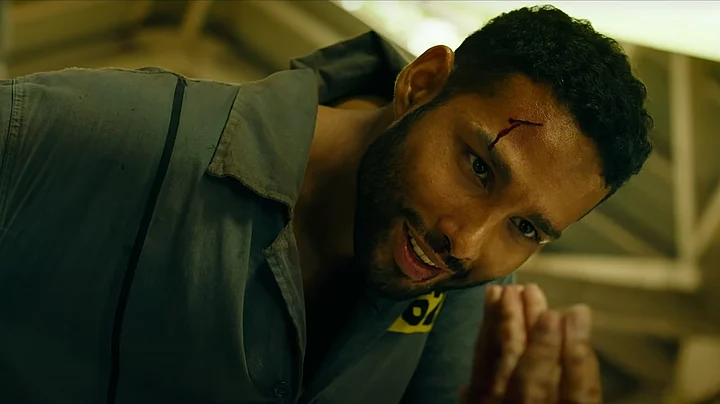In the opening sequence, a wounded man plunges into the ocean as a massive propeller blade slowly cuts through the water surrounding him. This visual is arresting enough for you to pay attention and so you let yourself indulge in Yudhra. If this was a 2000s rom-com, this is where you would hear a record scratch and, in voiceover, the character would say, “Yes, that’s me! I bet you’re wondering how I got here.”
Yudhra (Siddhant Chaturvedi) does something similar – a voiceover takes us back in time for answers. Having lost his parents to a car accident Yudhra is essentially raised by his father’s colleagues (Gajraj Rao and Ram Kapoor). Yudhra has a tendency to fly off the handle in a blinding rage and Kapoor’s character opines that this rage would be better off redirected somewhere else.
And that is how Yudhra finds himself facing off a drug syndicate with the ruthless drug lord Feroz (Raj Arjun) at the helm supported by his spoilt son Shafiq (Raghav Juyal). So far, there’s nothing new that Yudhra is offering. If you’re looking for a love interest, there’s a childhood to lovers story waiting for you with Yudhra and Nikhat (Malavika Mohanan).
In an attempt to keep the viewers engaged with twists and turns, the screenplay builds a film that feels like a Frankenstein’s monster-esque mishmash of multiple other films. Many of the set pieces are brilliant and the action choreography complements the set up well. I found myself thinking of Kill and one of the things that impressed me the most about the way the action sequences for designed – the use of everything the characters could find in their vicinity.
One particular action sequence in Yudhra stands out for the way the characters use music instruments to protect themselves. A flute becomes a deathly weapon and musical notes become a mode of distraction. It’s in these moments where the technical aspects of Yudhra still manage to pull you in. But the haphazard screenplay is still at the back of your mind which results in a kind of push-and-pull with the film that hurts it more than it helps.
Siddhant Chaturvedi is definitely cut out for a role like this – every muscle in his body ripples with practiced precision as he tries to capture Yudhra’s rage. Oftentimes, he is equated to a revving bike and while the metaphor is simply not set up well enough to have the desired effect, Chaturvedi manages to partially sell it with his body language. But you can’t shake off the feeling that the actor is being underutilised.
One of the main reasons for this is that Yudhra is more action than it is words. Forgive me for taking a second segue into Kill but stay with me. When we see the characters in Kill spar with each other, the tension doesn’t just come from the action sequences. The actual tension comes from the people – from Lakshya’s character’s need to protect and save even as his morality starts to slip away and from the class rage that Fani (Raghav Juyal) and his gang’s anger comes from.
There is an ‘explanation’ and ‘pattern’ to the anger and the madness; something that feels absent here.
Speaking of Juyal, the actor returns as a villain in Yudhra and it feels like déjà vu. When you manage to pull your eyes away from his outfits, you’re taken in by the charm he imbibes into Shafiq. However, considering that his character Fani in Kill became so iconic, this feeling of déjà vu bothers you. There’s also the feeling that this is another actor in the film who could’ve done so much more with the right layering.
This underutilization of skill haunts every character on screen – including veterans like Gajraj Rao and Ram Kapoor. Their performances are brilliant but it’s because they are good actors, not because they got the stage their acts deserved.
The movie attempts to sidestep the action heroine archetype, to its credit. Considering how flimsy the writing is, you expect Nikhat to stand and wait for her ‘hero’ to save her. But she does so much more, especially in the action set pieces. Her performance might not be as refined as you would expect but there is a potential for more.
There are points in the film where its pacing almost picks up but the flaw is in the very design. When you’re ready for the next chapter to play out, the film is interrupted by a song. There is nothing wrong with songs in action films – to expect songs to leave a Bollywood movie would be irrational but even the placement of songs matters.
I can’t be expected to believe that people who have just found out their lives are in immediate danger would engage in song and dance on a beach just because they found an end to their situationship.
A few years ago, Yudhra might’ve been more digestible than it is now but filmmakers are beginning to give their characters and stories more depth than before. And even if this was an action film designed just for rage-fuelled masala, it needed a better screenplay and a much better design to work.
As things stand, Yudhra is more pretty than anything else. If expert cinematography and art design is your thing, you might still take away something from the film. But if not, there isn’t much for you to root for.
(At The Quint, we question everything. Play an active role in shaping our journalism by becoming a member today.)
